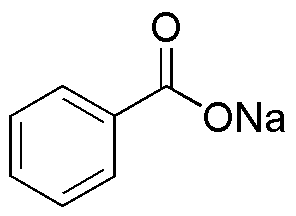Benzoic acid sodium salt is widely utilized in research focused on:
- Food Preservation: This compound acts as a preservative in various food products, helping to inhibit the growth of mold, yeast, and some bacteria, thereby extending shelf life and ensuring safety.
- Pharmaceutical Formulations: It is commonly used in the pharmaceutical industry as a buffering agent and preservative in medications, enhancing stability and efficacy.
- Cosmetic Products: In cosmetics, it serves as a pH regulator and preservative, ensuring product safety and effectiveness while maintaining a pleasant user experience.
- Industrial Applications: It is utilized in the production of dyes, plastics, and other chemicals, contributing to the manufacturing of various consumer goods.
- Biochemical Research: Researchers use this compound in laboratory settings for various biochemical assays, as it can act as a substrate or inhibitor in enzymatic reactions.
Informations générales
Propriétés
Sécurité et réglementation
Applications
Benzoic acid sodium salt is widely utilized in research focused on:
- Food Preservation: This compound acts as a preservative in various food products, helping to inhibit the growth of mold, yeast, and some bacteria, thereby extending shelf life and ensuring safety.
- Pharmaceutical Formulations: It is commonly used in the pharmaceutical industry as a buffering agent and preservative in medications, enhancing stability and efficacy.
- Cosmetic Products: In cosmetics, it serves as a pH regulator and preservative, ensuring product safety and effectiveness while maintaining a pleasant user experience.
- Industrial Applications: It is utilized in the production of dyes, plastics, and other chemicals, contributing to the manufacturing of various consumer goods.
- Biochemical Research: Researchers use this compound in laboratory settings for various biochemical assays, as it can act as a substrate or inhibitor in enzymatic reactions.
Documents
Fiches de données de sécurité (FDS)
La FDS fournit des informations de sécurité complètes sur la manipulation, le stockage et l’élimination du produit.
Spécifications du produit (PS)
Le PS fournit une description complète des propriétés du produit, notamment sa composition chimique, son état physique, sa pureté et les exigences de stockage. Il détaille également les plages de qualité acceptables et les applications prévues du produit.
Certificats d'analyse (COA)
Recherchez des certificats d'analyse (COA) en saisissant le numéro de lot du produit. Les numéros de lot et de lot se trouvent sur l'étiquette d'un produit, après les mots « Lot » ou « Lot de fabrication ».
Numéro de catalogue
Numéro de lot/série
Certificats d'origine (COO)
Ce certificat d'exploitation confirme le pays dans lequel le produit a été fabriqué, et détaille également les matériaux et composants utilisés et s'il est issu de sources naturelles, synthétiques ou autres sources spécifiques. Ce certificat peut être requis pour les douanes, le commerce et la conformité réglementaire.
Numéro de catalogue
Numéro de lot/série
Fiches de données de sécurité (FDS)
La FDS fournit des informations de sécurité complètes sur la manipulation, le stockage et l’élimination du produit.
DownloadSpécifications du produit (PS)
Le PS fournit une description complète des propriétés du produit, notamment sa composition chimique, son état physique, sa pureté et les exigences de stockage. Il détaille également les plages de qualité acceptables et les applications prévues du produit.
DownloadCertificats d'analyse (COA)
Recherchez des certificats d'analyse (COA) en saisissant le numéro de lot du produit. Les numéros de lot et de lot se trouvent sur l'étiquette d'un produit, après les mots « Lot » ou « Lot de fabrication ».
Numéro de catalogue
Numéro de lot/série
Certificats d'origine (COO)
Ce certificat d'exploitation confirme le pays dans lequel le produit a été fabriqué, et détaille également les matériaux et composants utilisés et s'il est issu de sources naturelles, synthétiques ou autres sources spécifiques. Ce certificat peut être requis pour les douanes, le commerce et la conformité réglementaire.


